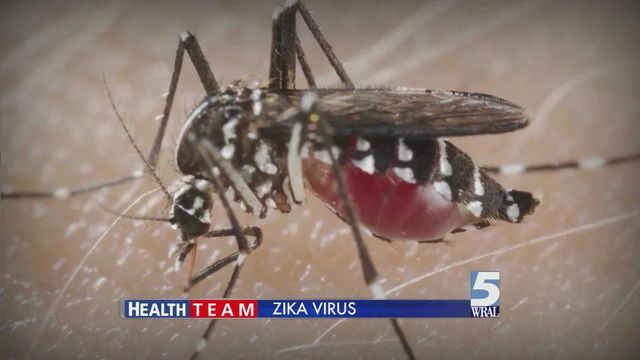Q&A: When should people be tested for the Zika virus?
There have been no reported cases of the mosquito-borne Zika virus in North Carolina, but local physicians are on alert as the World Health Organization declared an international health emergency.
Posted — UpdatedSue Lynn Ledford, head of Wake County Human Services, said the state is aggressively monitoring the Zika virus because there are people traveling to 22 affected countries, such as Brazil, which has the highest number of reported cases.
Physicians in North Carolina are coordinating Zika virus testing with the Centers for Disease Control in Atlanta, and Dr. Megan Davies, state epidemiologist, sent a memo on the diagnosis, management and reporting of potential Zika Virus infections.
Davies' four-page report advises health care providers on blood testing of asymptomatic pregnant women who have traveled to areas with ongoing Zika virus transmission. It offers new guidelines on prevention measures and on the collection of blood specimens.
There is a large outbreak in Brazil, and the virus has also been identified in many other areas of Central and South America, the Caribbean and other countries.
The biggest worry is about pregnant women giving birth to babies with birth defects, such as small heads and brain damage. Recent studies have confirmed the Zika virus is the culprit.
In an article published recently in the New England Journal of Medicine, the Zika virus was found in the abnormally small brain of a fetus aborted at 29 weeks. The brain also lacked the typical folds and convolutions found in a brain at the same stage of development.
Isolated cases of Zika virus transmission through blood transmission and sexual contact have been reported. However, the vast majority of the cases are caused by transmission of the virus via a mosquito that has bitten an infected individual.
Pregnant women who develop symptoms, such as a fever, rash, red eyes or joint pain, within two weeks of travel to a country with ongoing transmission should see a health care provider and should be referred for serologic blood testing.
That testing can also be offered to pregnant women without symptoms two to 12 weeks after travel to countries with ongoing transmission.
The CDC and the American Congress of Obstetricians and Gynecologists also recommend an ultrasound evaluation for pregnant women without symptoms if they have been to one of those countries at any time during their pregnancy.
Doctors will be looking for signs of fetal microcephaly or small heads and brain calcifications. Follow-up ultrasounds may be recommended.
Pregnant women should speak with their OB-GYNS about the value of these ultrasound measurements.
The CDC wants pregnant women to postpone trips to areas where the Zika virus is active.
Pregnant women and those trying to become pregnant should talk with their health care provider first and strictly follow steps to avoid mosquito bites.
People being evaluated for Zika virus infections shoud use personal protective measures to avoid exposure to mosquitos seven days after symptoms begin. These measures include using insect repellant, covering up and reducing sites where mosquitoes breed, such as standing water in flower pots or basins.
In addition, there should be no blood donations until symptoms have resolved and until 28 days after the trip.
Men who have traveled to areas where Zika is active should avoid sex with a pregnant partner or use condoms.
Non-pregnant patients with signs and symptoms of Zika virus infections within two weeks of travel may be tested as well.
• Credits
Copyright 2024 by Capitol Broadcasting Company. All rights reserved. This material may not be published, broadcast, rewritten or redistributed.





